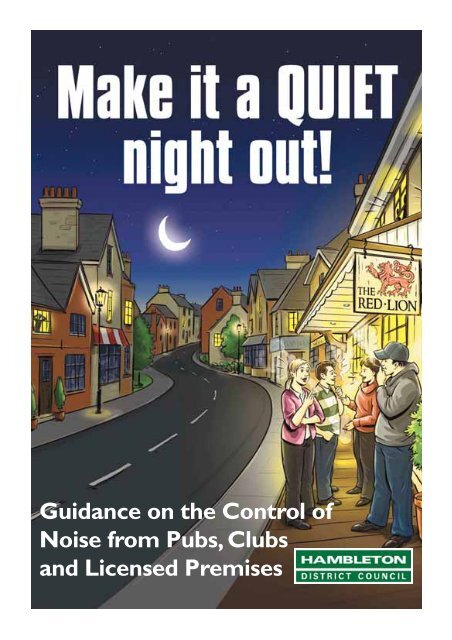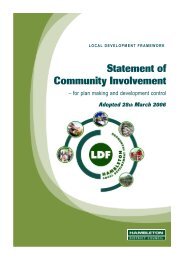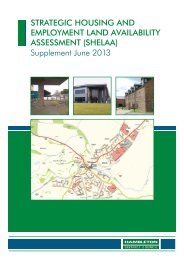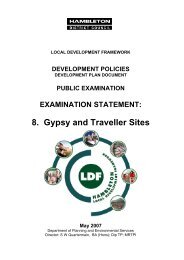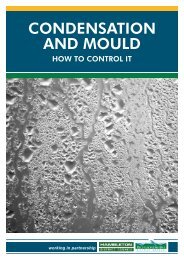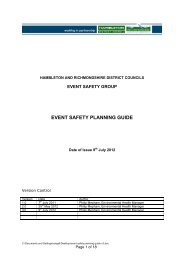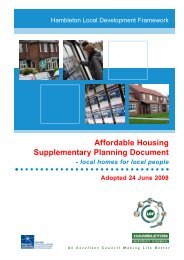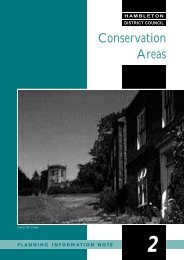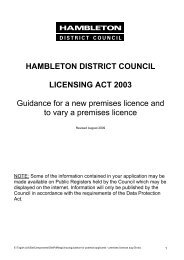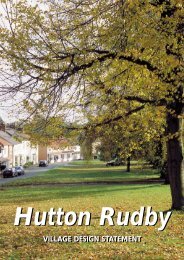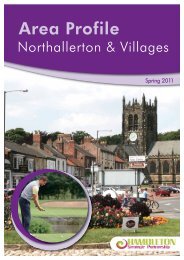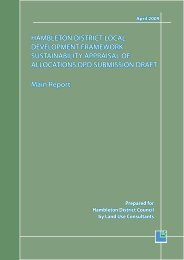Guidance on the Control of Noise from Pubs, Clubs and Licensed ...
Guidance on the Control of Noise from Pubs, Clubs and Licensed ...
Guidance on the Control of Noise from Pubs, Clubs and Licensed ...
- No tags were found...
Create successful ePaper yourself
Turn your PDF publications into a flip-book with our unique Google optimized e-Paper software.
<str<strong>on</strong>g>Guidance</str<strong>on</strong>g> <strong>on</strong> <strong>the</strong> C<strong>on</strong>trol <strong>of</strong><strong>Noise</strong> <strong>from</strong> <strong>Pubs</strong>, <strong>Clubs</strong><strong>and</strong> <strong>Licensed</strong> Premises
Entertainment in pubs <strong>and</strong> clubs is atraditi<strong>on</strong>al <strong>and</strong> important part <strong>of</strong>community life. It brings business for <strong>the</strong>licensee <strong>and</strong> for <strong>the</strong> local ec<strong>on</strong>omy.However, noise disturbance <strong>from</strong> licensed premises is acomm<strong>on</strong> cause <strong>of</strong> complaint by residents <strong>of</strong> Hamblet<strong>on</strong>District Council. Complaints can arise <strong>from</strong> a variety <strong>of</strong>different sources such as loud music, use <strong>of</strong> beer gardens,smoking shelters, raised voices, deliveries, <strong>and</strong>mechanical extract ventilati<strong>on</strong>.Residents living near to licensed premises should expecta certain amount <strong>of</strong> disturbance but not to <strong>the</strong> extentthat it causes <strong>the</strong>m a noise nuisance. Modernamplificati<strong>on</strong> systems <strong>and</strong> music styles make noise anincreasing problem. Some premises may be open l<strong>on</strong>ger<strong>and</strong> later than <strong>the</strong>y used to be, whilst <strong>the</strong> introducti<strong>on</strong> <strong>of</strong><strong>the</strong> smoking ban has created additi<strong>on</strong>al problems <strong>of</strong>people entering <strong>and</strong> leaving <strong>the</strong> premises throughout <strong>the</strong>night. However, effective management can resolve <strong>the</strong>seproblems <strong>and</strong> ensure licensing c<strong>on</strong>diti<strong>on</strong>s are met.This informati<strong>on</strong> leaflet will assist you in complaintresoluti<strong>on</strong> <strong>and</strong> help you maintain a good relati<strong>on</strong>shipwith your neighbours.
How to carry out a noise assessmentIn preventing noise nuisance it is essential that <strong>the</strong> locati<strong>on</strong>, equipment <strong>and</strong> structure<strong>of</strong> your premises are suitable for <strong>the</strong> intended entertainment. In some areas, existingbackground noise levels will be very low <strong>and</strong> will reduce fur<strong>the</strong>r during <strong>the</strong> night.Any noise created by licensed activities will seem louder <strong>and</strong> are more likely todisturb neighbours, especially when <strong>the</strong>y are trying to sleep.To fully underst<strong>and</strong> <strong>the</strong> impact your premises has <strong>on</strong> local residents you will needto carry out a noise assessment.This is very simple. Several times during openinghours - especially during <strong>the</strong> night or before closing - go outside <strong>and</strong> walk around<strong>the</strong> perimeter <strong>of</strong> your premises <strong>and</strong> to <strong>the</strong> boundary <strong>of</strong> <strong>the</strong> nearest noise sensitiveproperty.If you can hear noise <strong>from</strong> entertainment, singing, voices etc it is likely yourneighbours will be hearing <strong>the</strong> same noise <strong>and</strong> complaints may follow. Try todetermine <strong>the</strong> source(s) <strong>of</strong> noise heard <strong>and</strong> how it is escaping <strong>from</strong> <strong>the</strong> premises.Remember that if you have been subject to loud music for an hour or so, yourhearing will not be as sensitive <strong>and</strong> noise levels can easily be underestimated. As part<strong>of</strong> <strong>the</strong> assessment also speak to your neighbours, who may be able to give you avaluable insight as to when specific noise problems occur.Once <strong>the</strong> assessment is complete c<strong>on</strong>sider how <strong>the</strong> c<strong>on</strong>trols overleaf can reducenoise levels to an acceptable level <strong>the</strong>n repeat <strong>the</strong> assessment.A realistic noise assessment may show that your establishment is not suitable for<strong>the</strong> type <strong>of</strong>entertainment or hours<strong>of</strong> operati<strong>on</strong> you wish tooperate, due to <strong>the</strong>likelihood <strong>of</strong> noisedisturbance. In this caseyou may wish to employ<strong>the</strong> services <strong>of</strong> a noisec<strong>on</strong>sultant to carry out amore detailedassessment.The Councilcan provide a list <strong>of</strong> localproviders <strong>of</strong> this service.
C<strong>on</strong>trol <strong>of</strong> Music LevelsThe louder <strong>the</strong> music is <strong>the</strong> louderit will be outside. Reduce <strong>and</strong> setvolume levels <strong>on</strong> <strong>the</strong> amplificati<strong>on</strong>system.Music is made up <strong>of</strong> many differentfrequencies. Low frequencies or bassnoise, travel easier throughsurrounding structures i.e.windows <strong>and</strong> walls, without beingabsorbed <strong>and</strong> will more likely to beheard outside. Reduce <strong>the</strong> basslevels <strong>on</strong> <strong>the</strong> music amplificati<strong>on</strong>system.The best way to permanentlyc<strong>on</strong>trol music levels is to install anoise-limiting device. There are avariety <strong>of</strong> systems available <strong>and</strong> youneed to ensure that you get <strong>the</strong> right <strong>on</strong>e for your business. The device isset at a maximum noise level - chosen to ensure that noise cannot be heardoutside or at nearby noise sensitive properties, <strong>and</strong> <strong>the</strong> system is <strong>the</strong>n locked.Music played through this device will not be permitted to exceed this presetlevel. If <strong>the</strong> music levels start to increase a warning light will be triggered towarn <strong>the</strong> DJ to reduce <strong>the</strong> volume. If levels are not reduced <strong>the</strong> power is cut<strong>of</strong>f <strong>and</strong> <strong>the</strong> music stopped. This is a good idea if you have regular or differenttypes <strong>of</strong> entertainment such as; karaoke, DJs or live b<strong>and</strong>s.Correctly positi<strong>on</strong> <strong>the</strong> speakers. Ideally <strong>the</strong>y should not face any windows,external doors or within c<strong>on</strong>servatories where music can escape outside. Itis better to have lots <strong>of</strong> smaller speakers “dotted” around that can beindividually c<strong>on</strong>trolled ra<strong>the</strong>r than <strong>on</strong>e large powerful speaker. The allowsmusic volume <strong>from</strong> speakers next to windows or doors to be reduced.Remember <strong>the</strong> <strong>Noise</strong> at Work Regulati<strong>on</strong> 2005 also apply to your premises. Aninformati<strong>on</strong> leaflet <strong>on</strong> this subject is available <strong>from</strong> this department.
Structural Adaptati<strong>on</strong>sSometimes adaptati<strong>on</strong>s to <strong>the</strong> structure may be needed to prevent noise escaping.You may wish to c<strong>on</strong>sider:Upgrading windows to double or acoustic glazing will help c<strong>on</strong>tain more noise.Remember that if windows are open or even ajar, noise will escape regardless<strong>of</strong> <strong>the</strong> type <strong>of</strong> glazing you have. Ensure windows are kept closed duringentertainment events or kept locked to prevent opening.The provisi<strong>on</strong> <strong>of</strong> air c<strong>on</strong>diti<strong>on</strong>ing units or mechanical ventilati<strong>on</strong> will avoid<strong>the</strong> need to open windows in warm stuffy envir<strong>on</strong>ments. Mechanicalventilati<strong>on</strong> units need to be positi<strong>on</strong>ed correctly <strong>and</strong> may require acousticbaffles to prevent creating fur<strong>the</strong>r noise problems.C<strong>on</strong>sider creating an enclosed lobby to external doors. This allows people toenter through <strong>the</strong> first door which will close behind <strong>the</strong>m before opening <strong>the</strong>sec<strong>on</strong>d door, <strong>the</strong>refore c<strong>on</strong>taining <strong>the</strong> sound.All external doors <strong>and</strong> emergency exits should be close fitting or acousticallysealed to prevent noise escaping.If your premises share a party wall, floor orro<strong>of</strong> with a residential property specificsound insulati<strong>on</strong> works to upgrade walls <strong>and</strong>ceilings to stop <strong>the</strong> transmissi<strong>on</strong> <strong>of</strong> noise maybe necessary. You may need to c<strong>on</strong>sult <strong>the</strong>Fire Officer, Building C<strong>on</strong>trol Service or anacoustic specialist. It is important NOT toplace speakers, TV units etc <strong>on</strong>to partystructures, as noise will be transmitteddirectly through into <strong>the</strong> adjoining property.Keep loudspeakers away <strong>from</strong> party walls <strong>and</strong>place <strong>on</strong> an absorbent material e.g. acoustic,rubber mats which will minimise noisetransmitted through <strong>the</strong> floor. Speakers canalso be hung <strong>from</strong> <strong>the</strong> ceiling.
Beer Gardens, Outdoor Areas <strong>and</strong> Smoking SheltersCareful c<strong>on</strong>siderati<strong>on</strong> should be given to <strong>the</strong> siting <strong>of</strong> gardens, play areas, smokingshelters <strong>and</strong> barbecues to minimise potential nuisance to local residents. The mainc<strong>on</strong>cern for noise will be during <strong>the</strong> night but, depending <strong>on</strong> <strong>the</strong> circumstances,locati<strong>on</strong> <strong>and</strong> extent <strong>of</strong> your operati<strong>on</strong>s, day time noise may also become a problem,e.g. children’s play areas.Careful positi<strong>on</strong>ing <strong>of</strong> outside areas is required. For example, if you place asmoking shelter in <strong>the</strong> direct line <strong>of</strong> visi<strong>on</strong> to a residential property <strong>the</strong>n noisewill travel directly <strong>the</strong>re. Placing <strong>the</strong> smoking shelter behind a structure /building will allow some <strong>of</strong> <strong>the</strong> noise to be absorbed. Close boarded fences<strong>and</strong> brick walls can be used in a similar way but you need to c<strong>on</strong>sider bedroomwindows. Planting <strong>of</strong> trees <strong>of</strong>fer no reducti<strong>on</strong> in noise levels however it doesprovide a psychological barrier reducti<strong>on</strong>. Smoking shelters should be sited asfar away <strong>from</strong> houses <strong>and</strong> gardens as possible.Avoid loose gravel paths <strong>and</strong> timber decking which can create more noisethan paving st<strong>on</strong>es. Attach rubber feet to chairs <strong>and</strong> tables to prevent noise<strong>from</strong> scratching noise against a st<strong>on</strong>e floor.Raised voices <strong>from</strong> people using a beer garden can easily cause noise problems<strong>and</strong> <strong>the</strong>se areas need to be carefully managed. Signs should be put up at exits<strong>and</strong> in beer gardens advising people to be c<strong>on</strong>siderate. Also c<strong>on</strong>siderrestricting or supervising <strong>the</strong> number <strong>of</strong> people using <strong>the</strong>se areas, <strong>and</strong>discourage use after dark i.e. provide <strong>on</strong>ly minimal lighting <strong>and</strong> remove seatingor heating.If complaints <strong>from</strong> residents are received you may have to limit <strong>the</strong> use <strong>of</strong><strong>the</strong>se areas <strong>and</strong> prevent access. A good curfew to apply is 9pm, when it is likelypeople, especially children, will be using <strong>the</strong>ir bedrooms. This will depend <strong>on</strong>circumstances <strong>and</strong> locati<strong>on</strong> so speak to your neighbours to find out what issuitable.Do not permit <strong>the</strong> use <strong>of</strong> loud speakers in outside areas.C<strong>on</strong>trol your customers when <strong>the</strong>y leave. Rowdy behaviour <strong>and</strong> raised voicesin <strong>the</strong> street can lead to complaints. Try reducing <strong>the</strong> volume or changing <strong>the</strong>type <strong>of</strong> music towards <strong>the</strong> end <strong>of</strong> <strong>the</strong> evening or even stopping 30 minutesbefore closing time. Encourage customers to leave in small numbers,discourage loitering around <strong>the</strong> premise or even <strong>of</strong>fer to ph<strong>on</strong>e for taxis.C<strong>on</strong>sider how your customers leave <strong>and</strong> whe<strong>the</strong>r <strong>the</strong>re is a different exit <strong>the</strong>ycould use which does not go directly past residential properties. Place signs<strong>on</strong> <strong>the</strong> exits asking customers to leave quietly or even relay a similar messagethrough <strong>the</strong> public address system. Door staff should assist in minimisingdisturbance by actively managing entrances <strong>and</strong> exits.
Deliveries <strong>and</strong> Bottle Storage AreasDeliveries <strong>and</strong> collecti<strong>on</strong>s are noisy,eg. <strong>the</strong> refrigerati<strong>on</strong> units <strong>on</strong> deliveryvehicles, <strong>the</strong> changing <strong>of</strong> barrels,rattles <strong>of</strong> bottles <strong>and</strong> collecti<strong>on</strong> <strong>of</strong>refuse. The most effective way <strong>of</strong>minimising impact is to ensure <strong>the</strong>ytake place at reas<strong>on</strong>able times ie.between 8am <strong>and</strong> 6pm, or provideadequate internal night time storageto prevent having to go outside.Plant <strong>and</strong> MachineryWhen purchasing new plant ormachinery such as chiller units, airc<strong>on</strong>diti<strong>on</strong>ing or extract ventilati<strong>on</strong>systems you need to c<strong>on</strong>sider <strong>the</strong>noise output <strong>and</strong> how <strong>and</strong> where itwill be positi<strong>on</strong>ed or fixed. Chillerunits may be required to workthroughout <strong>the</strong> night <strong>and</strong> noise levelswhich seem reas<strong>on</strong>able during <strong>the</strong>day may not be reas<strong>on</strong>able at 2am in<strong>the</strong> morning. Ideally plant ormachinery should be sited in such a way that <strong>the</strong> building structure provides asmuch screening as possible for <strong>the</strong> neighbours. If this is not possible c<strong>on</strong>trols suchas timers, silencers or acoustic enclosures can be used. Seek specialist advice <strong>from</strong><strong>the</strong> installer, manufacturer or an acoustic specialist. Regular maintenance <strong>of</strong> <strong>the</strong>semachines is essential to ensure noise levels are kept to a minimum. You may needplanning permissi<strong>on</strong> to install new plant or equipment.
Enforcement C<strong>on</strong>trolsPlease enjoy your entertainment, al<strong>on</strong>g with your customers, but remember – o<strong>the</strong>rpeople wish to enjoy <strong>the</strong>ir homes <strong>and</strong> gardens <strong>and</strong> ultimately <strong>the</strong> following c<strong>on</strong>trolscan be used:The Envir<strong>on</strong>mental Protecti<strong>on</strong> Act 1990 places a duty <strong>on</strong> <strong>the</strong> Council toinvestigate complaints <strong>of</strong> noise nuisance. If a noise is found to be causing a statutorynoise nuisance by affecting <strong>the</strong> health or materially interfering with <strong>the</strong> use <strong>and</strong>enjoyment <strong>of</strong> a neighbouring property <strong>the</strong>n a legal notice will be served <strong>on</strong> <strong>the</strong>pers<strong>on</strong> resp<strong>on</strong>sible, requiring <strong>the</strong> abatement <strong>of</strong> <strong>the</strong> noise. Failure to comply with <strong>the</strong>notice can result in a fine <strong>of</strong> up to £20,000.The Licensing Act 2003 requires that <strong>the</strong> activities <strong>of</strong> a licensable premise mustprevent public nuisance. In submitting a license applicati<strong>on</strong> you will have beenrequired to detail how you intend to achieve this. If complaints <strong>of</strong> nuisance arereceived <strong>and</strong> are shown to be justified your license may be reviewed, revoked orhave c<strong>on</strong>diti<strong>on</strong>s attached to prevent fur<strong>the</strong>r nuisance. If you fail to meet <strong>the</strong>c<strong>on</strong>diti<strong>on</strong>s <strong>of</strong> your license <strong>the</strong>n you may be prosecuted.The Anti-Social Behaviour Act 2003 allows a local authority to make a 24 hourclosure order if it is believed that public nuisance is being caused by noise <strong>from</strong>licensed premises, <strong>and</strong> <strong>the</strong>ir closure is necessary to prevent <strong>the</strong> nuisance.The <strong>Noise</strong> Act 1996 allows a local authority to serve a fixed penalty notice <strong>of</strong>£500 where noise <strong>from</strong> a licensed premises exceeds a permitted level in a domesticproperty.If you require any fur<strong>the</strong>r advice or informati<strong>on</strong> please c<strong>on</strong>tact:Envir<strong>on</strong>ment Unit, Hamblet<strong>on</strong> District Council, Civic Centre,St<strong>on</strong>e Cross, Northallert<strong>on</strong>, DL6 2UU.Tel 0845 1211 555 www.hamblet<strong>on</strong>.gov.ukA large print versi<strong>on</strong> <strong>of</strong> this leaflet is availableThe Civic Centre is accessible to peoplewith a wide range <strong>of</strong> disabilities.


